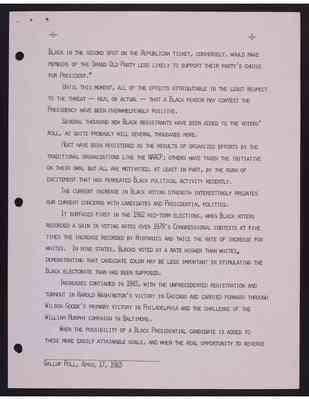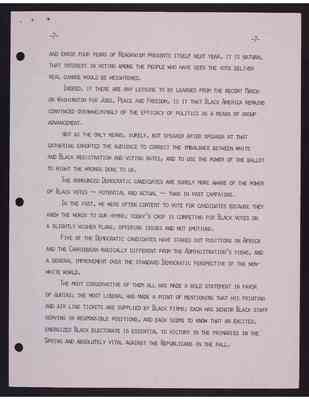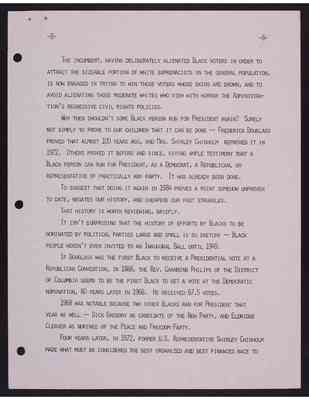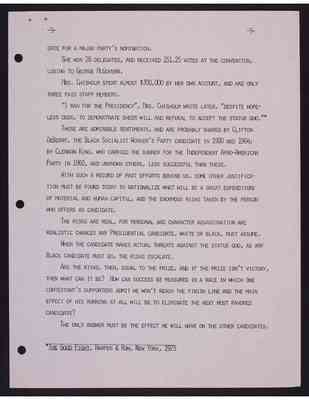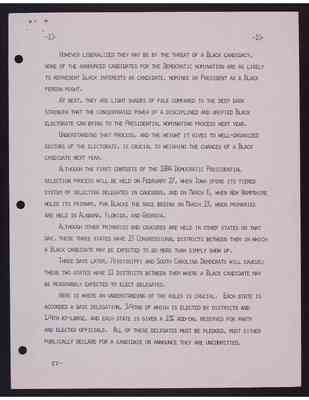Pages
6
-6-
Black in the second spot on the Republican ticket, conversely, would make members of the Grand Old Party less likely to support their party's choice for President.*
Until this moment, all of the effects attributable in the least respect to the threat -- real or actual -- that a Black person may contest the Presidency have been overwhelmingly positive.
Several thousand new Black registrants have been added to the voters' roll, as quite probably will several thousands more.
Most have been registered as the results of organized efforts by the traditional organizations like the NAACP; others have taken the initiatvie on their own, but all are motivated, at least in part, by the rush of excitement that has permeated Black political activity recently.
The current increase in Black voting strength interestingly predates our current concerns with candidates and Presidential politics.
It surfaced first in the 1982 mid-term elections, when Black voters recorded a gain in voting rates over 1978's Congressional contests at five times the increase recorded by Hispanics and twice the rate of increase for whites. In nine states, Blacks voted at a rate higher than whites, demonstrating that candidate color may be less important in stimulating the Black electorate than had been supposed.
Increases continued in 1983, with the unprecedented registration and turnout in Harold's Washington's victory in Chicago and carried forward through Wilson Goode's primary victory in Philadelphia and the challenge of the William Murphy campaign in Baltimore.
When the possibility of a Black Presidential candidate is added to those more easily attainable goals, and when the real opportunity to reverse
Gallup Poll, April 17, 1983
7
-7-
and erase four years of Reganism present itself next year, it is natural that interest in voting among the people who have seen the vote deliver real change would be heightened.
Indeed, if there are any lessons to be learned from the recent March on Washington for Job, Peace and Freedom, is it that Black America remains convinced overwhelmingly of the efficacy of politics as a means of group advancement.
Not as the only means, surely, but speaker after speaker at that gathering exhorted the audience to correct the imbalance between white and Black registration and voting rates, and to use the power of the ballot to right the wrongs done to us.
The announced Democratic candidates are surely more aware of the power of Black votes - potential and actual - than in past campaigns.
In the past, we were often content to vote for candidates because they knew the words to our hymns; today's crop is competing for Black votes on a slightly higher plane, offering issues and not emotions.
Five of the Democratic candidates have staked our positions of Africa and the Carribbean radically different from the Administration's views, and a general improvement over the standard Democratic perspective of the non-white world.
The most conservative of them all has made a bold statement in favor of quotas; the most liberal has made a point of mentioning that his printing and air line tickets are supplied by Black firms; each has senior Black staff serving in responsible positions, and each seems to know that an excited, energized Black electorate is essential to victory in the primaries in the spring and absolutely vital against the Republicans in the fall.
8
-8-
The incumbent, having deliberately alienated Black voters in order to attract the sizeable portion of white supremaccist in the general population, is now engaged in trying to win those voters whose skins are brown, and to avoid alienating those moderate whites who view with horror the Administration's regressive civil rights policies.
Why then shouldn't some Black person run for President again? Not simply to prove to our children that it can be done - Frederick Douglass proved that almost 100 years ago, and Mrs. Shirley Chisholm reproved it in 1972. Others proved it before and since, giving ample testimony that a Black person can run for President, as a Democrat, a Repulican, or representative of practically any party. It has already been done.
To suggest that doing it again in 1984 proves a point somehow unproven to date, negates our history, and cheapens our past struggles.
That history is worthy reviewing, briefly.
It isn't surprising tht the history of efforts by Blacks to be nominated by political parties large and small is no sketchy - Black people weren't even invited to a Inaugural Ball until 1949.
If Douglass was the first Black to receive a Presidential vote at a Republican Convention, in 1888, the Rev. Channing Philips of the District of Columbia seems to be the first Black to get a vote at the Democratic nomination, 80 years later in 1968. He received 67.5 votes.
1968 was notable because two other Blacks ran for President that year as well - Dick Gregory as candidate of the New Party, and Eldridge Cleaver as nominee of the Peace and Freedom Party.
Four years later, in 1972, former U.S. Representative Shirley Chisholm made what must be considered the best organized and best financed race to
9
-9-
date for a major party's nomination.
She won 28 delegates, and received 151.25 votes at the convention, losing to George McGovern.
Mrs. Chisholm spent almost $300,000 by her own account, and had only three paid staff members.
"I ran for the Presidency", Mrs. Chisholm wrote later, "despite hopeless odds, to demonstrate sheer will and refusal to accept the status quo."*
Those are admitable sentiments, and are probably shared by Clifton DeBerry, the Black Socialist Worker's Party candidate in 1980 and 1964; by Clennon King, who carried the banner for the Independent Afro-American Party in 1960, and unknown others, less successful than these.
With such a record of past efforts behind us, some other justification must be found today to rationalize what will be a great expenditure of material and human capital, and the enormous risks taken by the person who offers as candidate.
The risks are real, for personal and character assassination are realistic chances any Presidential candidate, white or black, must assume.
When the candidate makes actual threats against the status quo, as any Black candidate must do, the risks escalate.
Are the risks, then, equal to the prize, and if the prize isn't victory, then what can it be? How can sucess be measured in a race in which one contestant's supporters admit he won't reach the finish line and the main effect of his running at all will be to eliminate the next most favored candidate?
The only answer must be the effect he will have on the other candidates,
*The Good Fight, Harper & Row, New York, 1973
10
-10-
However liberalized they may be by the threat of a Black candidacy, none of the announced candiates for the Democratice nomination are as like to represent Black interests as candidate, nominee or President as a Black person might.
At best, they are light shades of pale compared to deep dark strength that the concentrated power of a disciplined and unified black electorate can bring to the Presidential nominating process next year.
Understanding that process, and the weight it gives to well-organized sectors of the electorate, is crucial to weighing the chance of a Black candidate next year.
Although the first contests of the 1984 Democratic Presidential selection process will be held on February 27, when Iowa opens its tiered system of selecting delegates in caucuses, and on March 6, when New Hampshire holds its primary, for Blacks the race begins on March 13, when primaries are held in Alabama, Florida, and Georgia.
Although other primaries and caucuses are held in other states on that day, these three states have 15 Congressional districts between them in which a Black candidate may be expected to do more than simply show up.
Three days later, Mississippi and South Carolina Democrats will caucus; these two states have 11 districts between them where a Black candidate may be reasonably expected to elect delegates.
Here is where an understanding of the rules is crucial. Each state is accorded a base delegation, 3/4ths of which is elected by districts and 1/4th at-large, and each state is given a 10% add-on, reserved for party and elected officials. All of these delegates must be pledged, must either publically declare for a candidate or announce they are uncommitted.
